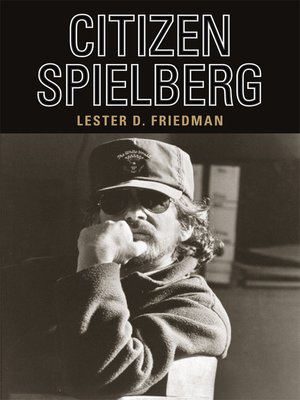
Sign up to save your library
With an OverDrive account, you can save your favorite libraries for at-a-glance information about availability. Find out more about OverDrive accounts.
Find this title in Libby, the library reading app by OverDrive.



Search for a digital library with this title
Title found at these libraries:
| Library Name | Distance |
|---|---|
| Loading... |
Steven Spielberg is the director or producer of over one third of the thirty highest grossing films of all time, yet most film scholars dismiss him as little more than a modern P. T. Barnum—a technically gifted and intellectually shallow showman who substitutes spectacle for substance. To date, no book has attempted to analyze the components of his worldview, the issues which animate his most significant works, the roots of his immense acceptance, and the influence his vast spectrum of imaginative products exerts on the public consciousness.
In Citizen Spielberg, Lester D. Friedman fills that void with a systematic analysis of the various genres in which the director has worked, including science fiction (E.T.), adventure (Raiders trilogy), race films (The Color Purple, Amistad), and war films (Saving Private Ryan, Schindler's List). Friedman concludes that Spielberg's films present a sustained artistic vision combined with a technical flair matched by few other filmmakers, and makes a compelling case for Spielberg to be considered as a major film artist.
|
Contents Acknowledgments Introduction: The Elephant in the Center of the Room 1. "I'm Sorry I Didn't Tell You about the World": Spielberg's Science-Fiction and Fantasy Films 2. "They Don't Know What They've Got There": Spielberg's Action/Adventure Melodramas 3. "Objects in the Mirror Are Closer Than They Appear": Spielberg's Monster Movies 4. "The World Has Taken a Turn for the Surreal": Spielberg's World War II Combat Films 5. "Whoever Tells the Best Story Wins": Spielberg's Social Problem/Ethnic Minority Films 6. "Control Is Power": Imagining the Holocaust Filmography Works Cited Index
|
"Friedman claims to have penned the first comprehensive analysis of [Spielberg's] films, and he may well be right."—Library Journal
"Friedman's treatment is an exhaustive and necessary catalog."—The American Interest
"There is an exhaustive overview of the components of Spielberg's corpus, the issues which animate his most significant works, the roots of his immense popularity amongst audiences, and the influence his vast spectrum of imaginative products exerts on the public consciousness. Friedman fills that void with a systematic analysis of the various genres in which the director has worked and concludes that Spielberg's films present a sustained artistic vision combined with a technical flair matched by few other filmmakers, and makes a compelling case for Spielberg to be considered as a major film artist."—Screening the Past
"Citizen Spielberg does a service to a monstrously influential director and an oeuvre whose investigations of emotion — especially contrained masculine emotions — have received insufficient book-length study."—The Bloomsbury Review
"Friedman seeks a more nuanced approach to Spielberg's cinematic output as director; taking readers through an analysis of his films and responding to the critical assessments of others, Friedman asserts that 'Spielberg is a far more complex, sophisticated, and wry filmmaker than most mainstream critics and academic scholars appreciate.'"—Shofar
"Encourage your brightest students to investigate Citizen Speilberg. It's the sort of book that by eschewing jargon but employing serious critical analysis could have a profound effect."—Splice
|
Lester D. Friedman is currently scholar-in-residence at Hobart and William Smith Colleges. He is the author of The Jewish Image in American Film,Arthur Penn's Bonnie and Clyde, and (with David Desser) American...







